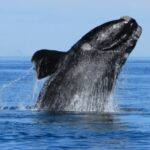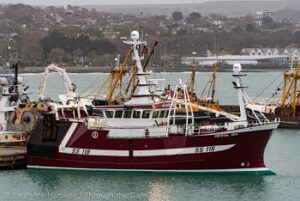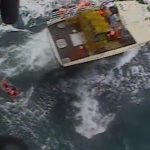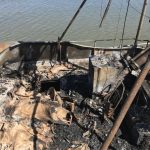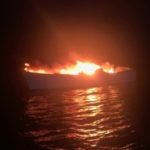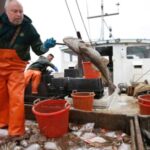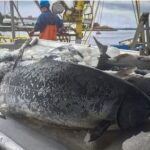Daily Archives: March 21, 2015
Regulators consider changes to herring catch limits. Because.
 The New England Fisheries Management Council is working on an amendment to the existing rules that is designed to make sure future catch limits are based on “scientific uncertainty” and the status of the herring stock, according to federal documents. The document is up for public comment now and could be approved sometime in the latter half of this year, said Lori Steele, a fishery analyst for the council. Atlantic Herring are not overfished and overfishing is not occurring, according to ASMFC Read the rest here 20:01 ASMFC Herring page
The New England Fisheries Management Council is working on an amendment to the existing rules that is designed to make sure future catch limits are based on “scientific uncertainty” and the status of the herring stock, according to federal documents. The document is up for public comment now and could be approved sometime in the latter half of this year, said Lori Steele, a fishery analyst for the council. Atlantic Herring are not overfished and overfishing is not occurring, according to ASMFC Read the rest here 20:01 ASMFC Herring page
Commissioners take small step toward buying Stock Island fish house
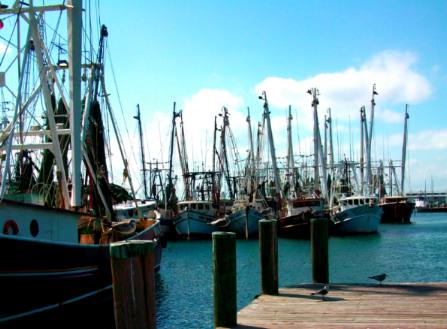 Lower Keys commercial fishermen asked Monroe County commissioners to throw them a lifeline by purchasing a Stock Island fish house and marina as working waterfront. Commissioners responded Wednesday that they want to keep the former Gulf Seafood property dedicated to commercial fishing but remain cautious on how to do it. “I want to preserve [the site] in perpetuity for commercial fishing, but not run a fish house,” Kolhage said. Read the rest here photo credit 18:26
Lower Keys commercial fishermen asked Monroe County commissioners to throw them a lifeline by purchasing a Stock Island fish house and marina as working waterfront. Commissioners responded Wednesday that they want to keep the former Gulf Seafood property dedicated to commercial fishing but remain cautious on how to do it. “I want to preserve [the site] in perpetuity for commercial fishing, but not run a fish house,” Kolhage said. Read the rest here photo credit 18:26
Coast Guard seizes red snapper from commercial shrimp vessel in South Texas
 At approximately 2:30 p.m. Tuesday afternoon, the Heron was on a routine patrol when they conducted a law enforcement boarding on the fishing boat Capt. Wallace B and discovered the illegal catch. Currently, the red snapper fishery in federal waters is only by commercial fishing vessels with reef fish permits with an individual fishing quota for red snapper. The recreational fishing season for red snapper in federal waters is closed. Read the rest here 14:50
At approximately 2:30 p.m. Tuesday afternoon, the Heron was on a routine patrol when they conducted a law enforcement boarding on the fishing boat Capt. Wallace B and discovered the illegal catch. Currently, the red snapper fishery in federal waters is only by commercial fishing vessels with reef fish permits with an individual fishing quota for red snapper. The recreational fishing season for red snapper in federal waters is closed. Read the rest here 14:50
Elver season opens Sunday in Maine, expected to start slow
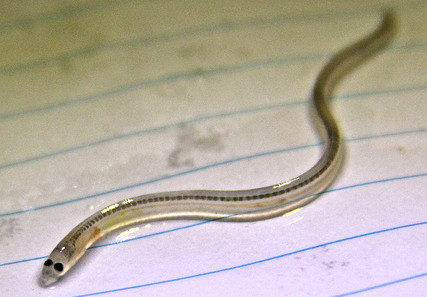 Darrel Young, president of the Maine Elver Fishermen’s Association, said Friday that because of low temperatures in the early part of last spring, he did not catch his first elver until the end of April. “I don’t think I’m going to catch one until then this year, either,” Young said. “ Last year was really quiet.” Read the rest here 14:09
Darrel Young, president of the Maine Elver Fishermen’s Association, said Friday that because of low temperatures in the early part of last spring, he did not catch his first elver until the end of April. “I don’t think I’m going to catch one until then this year, either,” Young said. “ Last year was really quiet.” Read the rest here 14:09
Don’t give up on groundfishing just yet
 “Why should we help those who destroyed their own fishery?” This is the question that is usually trotted out when there is a debate about allowing lobster bycatch on groundfish boats here in Maine. (Bycatch is the term that refers to species incidentally caught in fishing gear in addition to the primary targeted species.) There are other instances when this question is raised, usually when the phrase “struggling groundfish fleet” is incorporated into the conversation about the various problems associated with . Read the rest here 09:41
“Why should we help those who destroyed their own fishery?” This is the question that is usually trotted out when there is a debate about allowing lobster bycatch on groundfish boats here in Maine. (Bycatch is the term that refers to species incidentally caught in fishing gear in addition to the primary targeted species.) There are other instances when this question is raised, usually when the phrase “struggling groundfish fleet” is incorporated into the conversation about the various problems associated with . Read the rest here 09:41
The disastrous feedback of what happens when fisheries funding dries up
 Last week I had the good fortune of attending the NC Oyster Summit, hosted by the NC Coastal Federation in the Museum of Natural Sciences. Yet, the fact that stuck with me most is that despite all of these wonderful celebrations of the oyster for the health and well-being of NC’s coastal communities,,,The “Administrative Closure” of the most northern stretches of the state’s prized Albemarle-Pamlico estuary system is a worrying precedent in many ways that highlight how leadership withdrawal of support for science can trickle down to real economic, environmental, and cultural harm. Read the rest here 09:10
Last week I had the good fortune of attending the NC Oyster Summit, hosted by the NC Coastal Federation in the Museum of Natural Sciences. Yet, the fact that stuck with me most is that despite all of these wonderful celebrations of the oyster for the health and well-being of NC’s coastal communities,,,The “Administrative Closure” of the most northern stretches of the state’s prized Albemarle-Pamlico estuary system is a worrying precedent in many ways that highlight how leadership withdrawal of support for science can trickle down to real economic, environmental, and cultural harm. Read the rest here 09:10
I smell a rat. Several of them, in fact. Paul Cohan, Gloucester
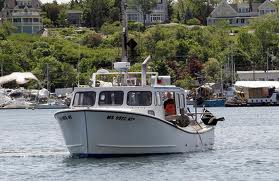 The fisheries collapse isn’t going to rectify itself at any time in the near future, that is, if the situation is as dire as NOAA and it’s ENGO puppet masters insist. Therefore, a buyout program, as originally incorporated into the industry disaster relief plan, is clearly not only a commitment, but a necessity. There is a substantial number of permit holders who have been forced to sell their boats in order to just catch up with their bills simply because they don’t have enough fish, and access to what few they do have, to remain solvent. Read the rest here 08:44
The fisheries collapse isn’t going to rectify itself at any time in the near future, that is, if the situation is as dire as NOAA and it’s ENGO puppet masters insist. Therefore, a buyout program, as originally incorporated into the industry disaster relief plan, is clearly not only a commitment, but a necessity. There is a substantial number of permit holders who have been forced to sell their boats in order to just catch up with their bills simply because they don’t have enough fish, and access to what few they do have, to remain solvent. Read the rest here 08:44
Crab shell socks: Coming soon to a retailer near you
 Alaska’s fishing industry dominates the state’s economy right behind oil, but the approximately 50 percent of scrap left from each fish after processing has largely gone to waste. Until now. Local fisherman Craig Kasberg has long considered using the waste after his salmon is filleted and in May, the first products from his start-up business, Tidal Vision, will become available online. Read the rest here 07:56
Alaska’s fishing industry dominates the state’s economy right behind oil, but the approximately 50 percent of scrap left from each fish after processing has largely gone to waste. Until now. Local fisherman Craig Kasberg has long considered using the waste after his salmon is filleted and in May, the first products from his start-up business, Tidal Vision, will become available online. Read the rest here 07:56






 Nora Fitzgerald always liked the attention her seal skin purse garnered, but not the kind it drew at a United States border crossing. Fitzgerald had no idea seal skin products were prohibited from being taken into the United States. Their crossing was going rather routine until a female agent asked about her purse. She said she was told seal is an endangered species, and fur products were not to be taken across the border.
Nora Fitzgerald always liked the attention her seal skin purse garnered, but not the kind it drew at a United States border crossing. Fitzgerald had no idea seal skin products were prohibited from being taken into the United States. Their crossing was going rather routine until a female agent asked about her purse. She said she was told seal is an endangered species, and fur products were not to be taken across the border.  A FISHING boat skipper has told of his terrifying brush with a submarine off the Outer Hebrides. Angus Macleod said his net was continually dragged in front of his 62ft trawler. He has sent reports to the Maritime and Coastguard Agency and the Marine Accident Investigation Branch. Angus, 46, said: “The only explanation I can think of is it’s a submarine. “It missed the nets, which is just as well. I think something got hold of the dog rope – which attaches to the top and bottom of the net – and the trawl wire. Whew!
A FISHING boat skipper has told of his terrifying brush with a submarine off the Outer Hebrides. Angus Macleod said his net was continually dragged in front of his 62ft trawler. He has sent reports to the Maritime and Coastguard Agency and the Marine Accident Investigation Branch. Angus, 46, said: “The only explanation I can think of is it’s a submarine. “It missed the nets, which is just as well. I think something got hold of the dog rope – which attaches to the top and bottom of the net – and the trawl wire. Whew! 

























